Research showing how Marketing Automation can support the lead-sales pipeline
Marketing automation has received a lot of attention over the past year. But you may still be sceptical, asking how can it actually grow my business’?
In this post, I want to dig into some of these benefits to explain precisely how marketing automation can help you grow your business.
In March 2014, Regalix conducted a study to identify the most common benefits of marketing automation, as told by marketers who had implemented the software.
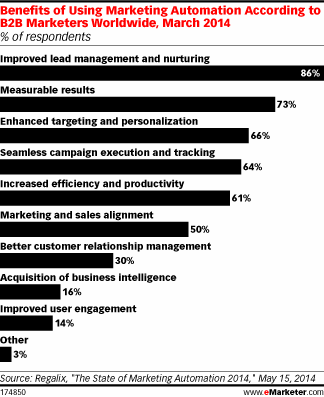
1. Improve your lead nurturing
According to the Regalix study above, the number one benefit of marketing automation software is the ability to manage and nurture leads.
In every business, you will have a mixture of hot and cold leads. It’s common sense to have your sales team focus their efforts on the hottest leads, as they have the highest probability of closing. But, what about those colder leads who aren’t quite ready to purchase yet? This is where lead nurturing comes in.
Below is an example of a simple lead nurturing campaign that sends a time-activated sequence of educational emails after someone downloads a free report. In each email, the lead is encouraged to request an appointment, which would indicate that they are now a qualified lead and may be ready to buy.
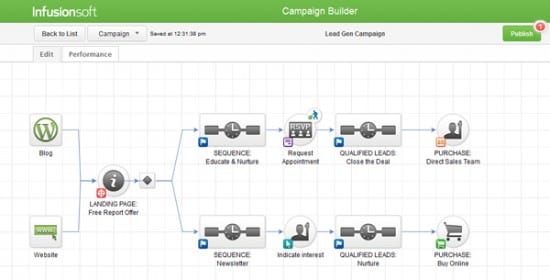
What’s valuable about this is that it provides a completely automated system for converting your cold leads into hot leads. With no ongoing time or effort required from your sales team, they end up with more hot leads on their plate to work with.
2. Improve your lead response times
A study from Harvard found that you’re seven times more likely to qualify a lead if you respond to an enquiry within an hour, compared to responding even an hour later and more than 60 times likelier than if you waited 24 hours or longer.
Yet, the same study found that, on average, the majority of companies take at least 12 hours to respond to an enquiry.
With marketing automation software, you can create automated email responses to ensure that every lead is responded to within the hour.
Skeptical that you can do this without it sounding robotic? As was I, until I heard about ‘Barry’, the automated salesperson. In this case study, a company replaced their manual lead qualification with an automation sequence that leads would talk to for months on end - completely unaware that they were speaking to an automated set of emails.
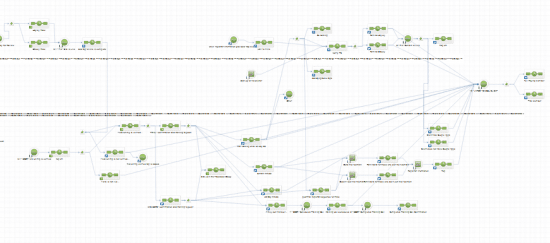 3. Improve your lead qualification process
3. Improve your lead qualification process
Research from the Annuitas Group found that businesses that had implemented marketing automation software had seen, on average, a 451% increase in qualified leads.
This is partly as a result of better targeting and personalisation of marketing, but also largely due to the fact that marketing automation software provides a framework to improve your lead qualification process.
With lead scoring that automatically updates when a lead completes certain actions (such as viewing your pricing page, or scheduling a call), you’re able to qualify leads more accurately, ensuring that you’re always focusing on those that are hottest and most valuable.
4. Reduce your sales and marketing overhead
One of the less obvious benefits of marketing automation is that it allows you to scale your marketing and sales efforts without needing lots of extra staff. One person can create an automation sequence that communicates with ten leads over the year, or ten thousand.
This has two important consequences.
- First of all, it reduces your sales and marketing overhead by reducing the need for additional staff. In fact, a study by Nucleus Research found that companies that implemented marketing automation software had a 12.2% reduction in marketing overhead.
- Secondly, it means that the staff you do have can focus on valuable and creative work, instead of repetitive tasks and low-value work, like manually checking in with cold leads.
5. Increase your sales productivity
In their New York Times best-selling book ‘Switch’, authors Dan and Chip Heath explain that, when it comes to changing a person’s behaviour it’s often best to change the environment and use ‘nudges’ rather trying to change behaviour directly.
Marketing automation software is a change of environment that provides a lot of helpful nudges for your sales team. By having a system take care of lead prioritisation, data entry, and nurturing, you remove the potential for human error, inconsistency, and suboptimal decision-making. The result is a more effective and productive sales team.
6. Align your sales and marketing team
In a typical workplace, the marketing team are responsible for generating leads to pass over to sales. They’ll use various tools to do this, and will typically measure their performance by the quantity or total value of leads delivered.
The sales team, on the other hand, are responsible for converting whatever leads are passed their way. Using a CRM system, they track each customer’s situation, working to push them as far through the funnel as possible.
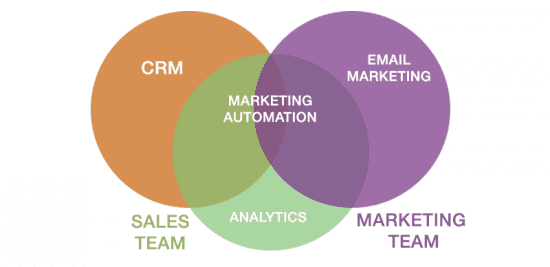
Ultimately, this is misaligned. The sales team capture reams of insights that the marketing team rarely sees, because there is little incentive (or awareness of its value) for sales teams to share it. Similarly, marketing teams can do a lot to pre-qualify and nurture the sales team’s leads - but there’s often no incentive to do so.
An interesting side effect noted by many companies implementing marketing automation software is that it tends to align the sales and marketing teams around the same goals.
By using one platform that shows both CRM and marketing data, marketers get instant access to the insights gathered by the sales team, and visa versa.
7. Enhanced targeting and personalisation
Perhaps one of the most obvious benefits of combining CRM and marketing data into a single platform, is the ability to precisely target your audience with personalised communication.
Unlike a typical email marketing platform, which may allow you to segment by location, subscribe date, and various custom field criteria, marketing automation gives you the ability to use far more advanced segmentation criteria.
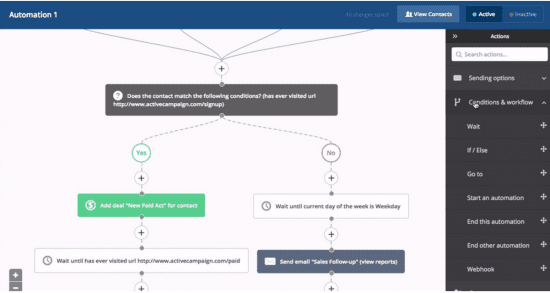
You could, for example, send a series of emails triggered by certain actions, such as repeatedly viewing a pricing page on your website, or by criteria such as whether or not they’re a CEO / director.
Ultimately, the more personalised your communication is, the more relevant it will be to the recipient. Relevancy increases the likelihood of purchase, which is just one more tangible benefit of marketing automation software.
Effectiveness of Marketing Automation
There’s no doubting the power and impact that marketing automation software can have on a business when used properly, but it’s important to end on the caveat that it’s not a silver bullet.
The effectiveness of automation software, or any tool or tactic for that matter, is largely dependent on your business and how you use it.
I hope the seven examples above provide inspiration for you to explore this software in more depth, and consider different ways that you may be able to use it to grow your business.
 Thanks to Marcus Taylor for sharing his advice and opinions in this post. Marcus is the founder of Venture Harbour, a company that runs a portfolio of online businesses including Marketing AutomationInsider.com. You can connect with Marcus on LinkedIn or Twitter.
Thanks to Marcus Taylor for sharing his advice and opinions in this post. Marcus is the founder of Venture Harbour, a company that runs a portfolio of online businesses including Marketing AutomationInsider.com. You can connect with Marcus on LinkedIn or Twitter.








 Thanks to Marcus Taylor for sharing his advice and opinions in this post. Marcus is the founder of
Thanks to Marcus Taylor for sharing his advice and opinions in this post. Marcus is the founder of 



